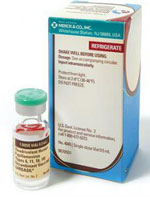Concerns about cost and promiscuity have led to many countries struggling to increase uptake of GlaxoSmithKline's ($GSK) and Merck's ($MRK) human papillomavirus (HPV) vaccines. England fits into this category, but survey data suggests it has a more fundamental problem: High-risk groups are less likely to be offered the vaccine.
 |
| Merck's Gardasil HPV vaccine--FierceBiotech file photo |
The data comes from a survey of 2,247 young women who attended sexual health clinics in England. Women who were at higher risk of catching HPV and developing cancer--because they smoked or first had sex at a young age--were less likely to be offered the HPV vaccine. Overall, 74% of respondents had been offered a HPV vaccine, but this figure dropped among high-risk groups. Less than two-thirds of women who had previously had a sexually transmitted infection were offered the vaccine, researchers report in Sexually Transmitted Infections.
Young women attending sexual health clinics are likely to be more vulnerable to HPV than the broader population, yet it appears vaccine outreach at these centers is lacking. "Sexual health services in the U.K. are not participating in the vaccination delivery programme and we believe that this is a huge missed opportunity. We feel that sexual health services are ideally placed to access these at risk women [and] to counsel them so that they can make an informed decision," study co-author Dr. Rachel Sacks told MedicalResearch.com. Sacks works at the National Health Service.
Currently, schools are where most young women are offered the HPV vaccine, but this excludes some particularly vulnerable groups, such as those not in education, employment or training (NEETs). The survey found that the proportion of NEETs at the sexual health clinic was higher than the national average. Offering these young women GSK's Cervarix or Merck's Gardasil at the clinic could increase uptake among NEETs. According to the survey, less than 50% of NEETs are vaccinated against HPV. English authorities think an overall uptake rate of 80% is needed to cut incidence of cervical cancer.
- here's the STI abstract
- read MedicalResearch.com's Q&A
- and Nursing in Practice's take